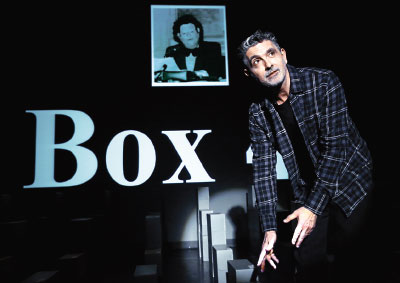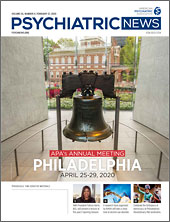An excerpt from the award-winning play “217 Boxes of Dr. Henry Anonymous,” about the psychiatrist who helped spark the movement to remove homosexuality from DSM, will be presented at this year’s Annual Meeting in Philadelphia.
Dr. Henry Anonymous was actually John Fryer, M.D., the psychiatrist who appeared in a mask as “Dr. Anonymous” at APA’s 1972 Annual Meeting in Dallas and announced that he was gay. The event was a major catalyst for the removal of homosexuality from DSM one year later.
Acclaimed actor Ken Marks, who played Fryer’s father, Ercel Fryer, in the off-Broadway production of “217 Boxes,” will perform a 30-minute monologue from the play in which he reads the speech that Fryer’s son delivered at the Dallas meeting.
The performance at the Annual Meeting is produced by Equality Forum, a nonprofit whose mission is to advance national and international lesbian, gay, bisexual, and transgender (LGBT) civil rights with an educational focus. The performance will be followed by a panel discussion including Marks; Ain Gordon who wrote “217 Boxes”; APA CEO and Medical Director Saul Levin, M.D., M.P.A.; Amir Ahuja, M.D., president of the Association of Gay and Lesbian Psychiatrists, and Malcolm Lazin, executive director of Equality Forum.
In an interview with Psychiatric News, Lazin said Fryer’s appearance in disguise, challenging his colleagues at the 1972 Annual Meeting, is a “seminal moment in American civil rights history.”
He noted that DSM was cited as an authority for discriminatory and repressive laws against homosexuals, as well as medical practices such as chemical castration and electroshock therapy. “In this way, John Fryer’s appearance in a mask before his colleagues was one of the darkest chapters in APA history,” he said. “Yet it was also one of the brightest, because his appearance compelled APA to look at whether the DSM classification was scientifically justified.”
The removal of homosexuality from the list of mental disorders a year later was crucial, because it removed the justification for discrimination—not just within APA and the profession of psychiatry, but more broadly throughout society.
“It was hugely consequential—the beginning of what turned out to be a 50-year process of changing societal attitudes,” Lazin said. “What John Fryer did had a remarkable ripple effect throughout society and down through the years. He was truly a major civil rights hero.”
“217 Boxes” was performed in its entirety during the Annual Meeting in New York in 2018. The story is drawn from the 217 boxes of records and papers belonging to Fryer that were stored at the Pennsylvania Historical Society in Philadelphia.
Gordon, a past Guggenheim Fellow and three-time Obie (off-Broadway theater) Award winner, spent two years as an “embedded artist” at the Pennsylvania Historical Society. With funding by the society and the Pew Center for the Arts and Heritage, he was charged to “look for personal battles for liberty.”
Fryer’s records and personal correspondence, stored in those 217 boxes, was a goldmine. “Much of my work as a playwright has been about the ways in which mainstream history edits out a lot of people and stories that don’t fit into or help promote the accepted narrative,” Gordon told Psychiatric News in an interview prior to the 2018 performance. “Inside those edited-out pieces of history is where I find my inspiration.”
The boxes of Fryer’s papers contained all manner of paraphernalia—charge receipts, airline ticket stubs—as well as letters and correspondence with friends, acquaintances, and colleagues. (The boxes also contained some patient records, which remain sealed and which Gordon was unable to see.)
Gordon drew a portrait of Fryer through the personification of three characters who were prominent figures in the archives: Alfred Gross, a social activist with whom Fryer collaborated to help gay men who had been arrested in bars or elsewhere for homosexual conduct; Fryer’s secretary, who elaborates in the play on Fryer’s therapy with men who were ill with HIV/AIDS in the 1980s; and Fryer’s father.
For Gordon, Fryer’s masked appearance as Dr. Anonymous in 1972 began to dominate much of the archival correspondence. “It occurred to me as my image of Fryer changed from box to box that in a way the mask had become more famous than the man,” Gordon said. “That seemed to me to be a metaphor for much of gay history.” ■
The 30-minute excerpt from “217 Boxes of Dr. Henry Anonymous” will be performed Monday, April 27, at 3 p.m. in the Michael Nutter Theater in the Pennsylvania Convention Center.

